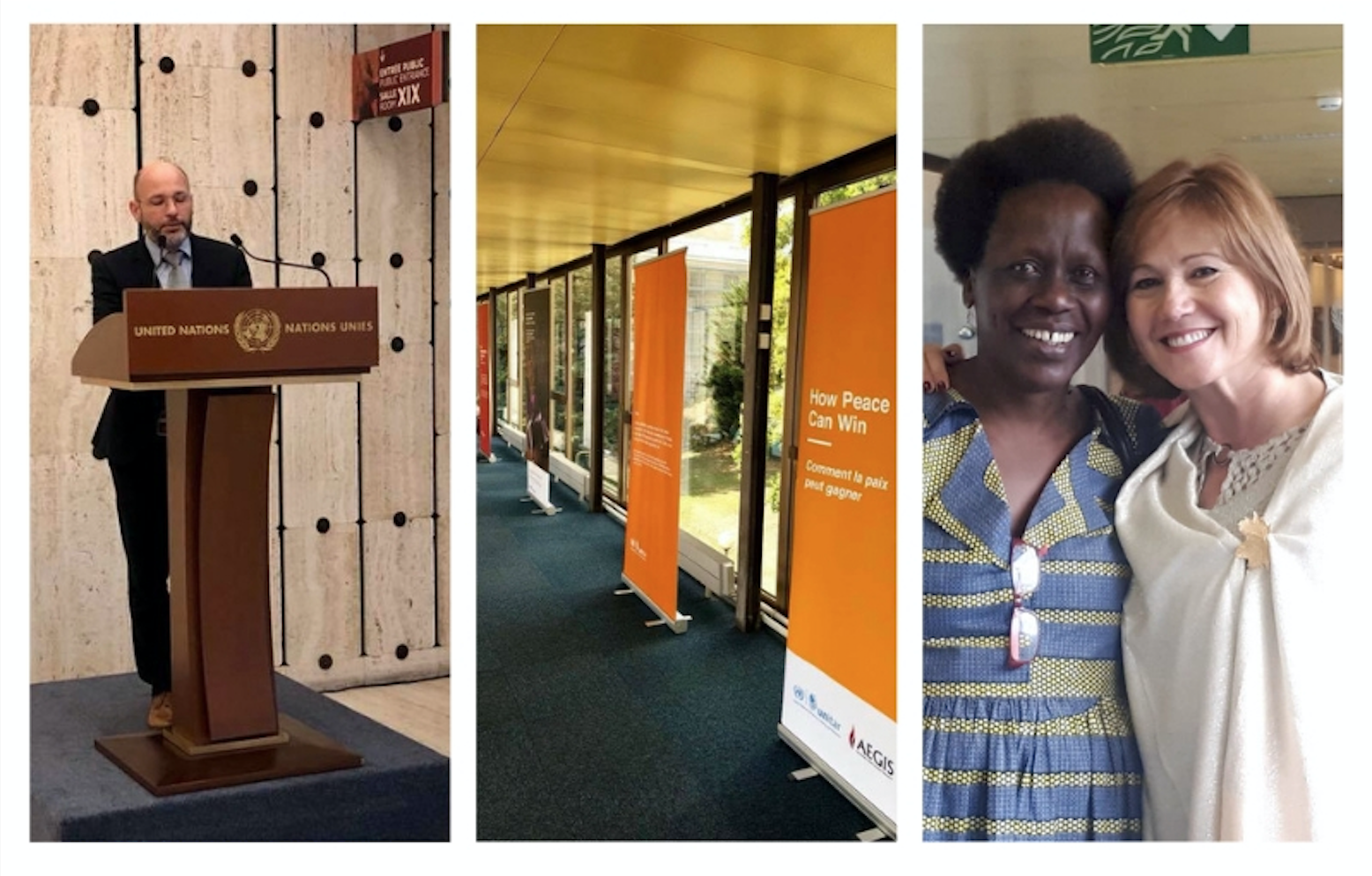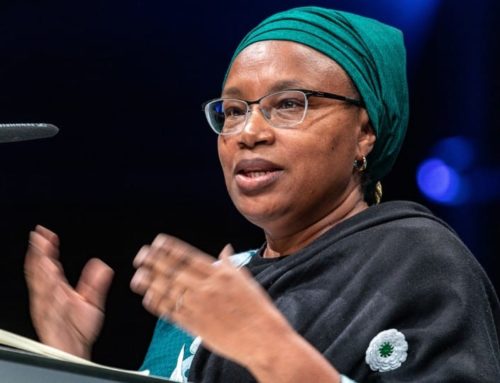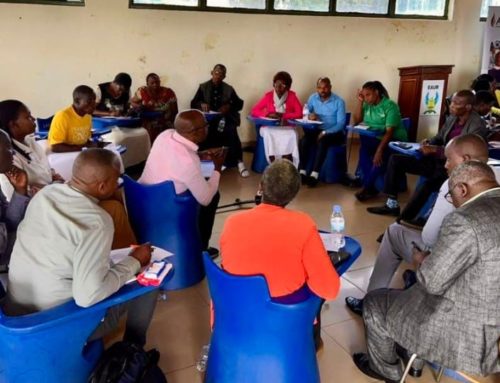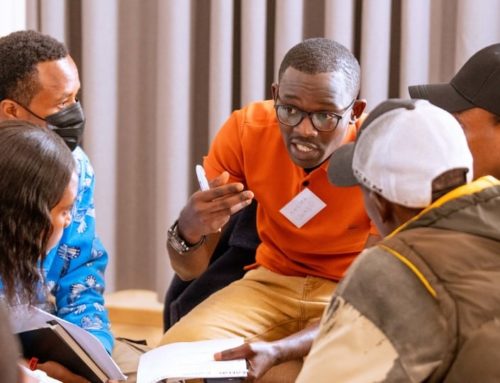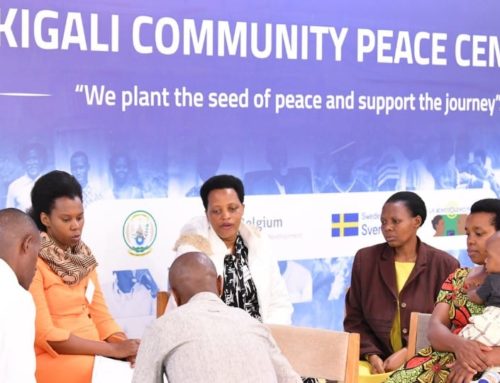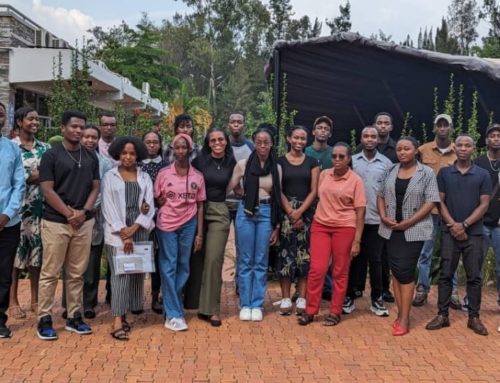At the Palais des Nations, the UN’s Geneva headquarters, the Aegis Trust yesterday launched a new exhibition in partnership with UNITAR, the United Nations Institute for Training and Research.
Titled ‘Education for Peace: Preventing Genocide at its roots’, the exhibition considers how humanity can be eroded in a society to the point of mass atrocities. It also shows how humanity is being cultivated as a means to break cycles of hate and violence in conflict zones through a new approach to peacebuilding education developed by the Aegis Trust in Rwanda, where it has been integrated into the national schools curriculum.
The exhibition launch was addressed by Ambassador Beatriz Londoño Soto, Colombia’s former Health Minister; by Dr James Smith, Chief Executive of the Aegis Trust, and by sociologist Esther Mujawayo-Keiner, a survivor of Rwanda’s 1994 Genocide against the Tutsi, whose words of warning also open the first short video in the exhibition.
“If it could have happened, it can happen again,” said Mujawayo-Keiner. “Rwandan genocidaires weren’t more savage than anyone else. It can happen anywhere if you don’t pay attention.”
“Mass atrocities kill humans in the same order of magnitude as the biggest diseases,” Dr Smith stated. “Vast resources are invested to curb malaria, HIV and cancer. Similar commitment is required to help protect people from the threat of genocide.”
“The path of reconciliation and the path of education in mutual understanding are the audacious ways that can get us out of the awful road of hate,” Ambassador Beatriz Londoño Soto commented in her address, drawing on Colombia’s own experience following the peace agreement with the FARC. “Learning how to understand others is a much harder work than learning how to just reject them. But at the end of the day, this understanding of the other will enhance our own world and will enrich our communities.” (For the full text of the Ambassador’s address, see below.)
As part of the UNITAR “Capital of Peace” initiative and Geneva Peace Week, the new Aegis-UNITAR exhibition will travel around Geneva during coming weeks. For details, visit: http://onlinelearning.unitar.org/exhibition-education-for-peace-preventing-genocide-at-its-roots/
REMARKS at the launch of “Education for Peace: Preventing Genocide at its Root”
Ambassador Beatriz London Soto, Permanent Representative of Columbia to United Nations, Geneva.
24 September 2018
Words matter. This is a constant in our work as diplomats. We negotiate and debate documents over and over until we reach agreements that constitute our framework of action at the national, regional and international level.
Because of this acute conscience that we share on the power of words, we also know that in the international arena, there are actions so horrendous and against human nature that we need to coin new words for them.
Genocide is one of these words. Its inventor was an international lawyer, Raphael Lemkin. He coined it in the context of the horrors of the Second World War, and it was intended to be used in the Nuremberg Trials against the Nazi war criminals.
Lemkin throughout his career had one conviction: the possibility of defending peace through criminal law. The adoption of the Convention on the Prevention and Punishment of the Crime of Genocide in 1948 was based on a draft presented by Lemkin himself, built on that very ground.
The adoption of the Rome Statute of the International Criminal Court, and its Article 6, ratified this general conviction: genocide is one of the most serious crimes of international concern and the Court has jurisdiction over individuals committing these horrendous acts.
However, criminal prosecution is one of the faces to solve the problem. We are gathered today to witness another crucial face to fight against this atrocious crime: prevention.
As the Secretary General of the United Nations holds it: prevention is the key word if we want to start solving the current and future crisis.
I think nobody would disagree with this crucial idea. But the question that remains is how to prevent, what does it mean to prevent, what kind of measures are necessary to actually prevent escalation of violence and the final commission of atrocious crimes.
As I said at the beginning of this speech: words matter, because words can easily lead to action; because words frame our way to see and conceive the world and our relations with other human beings.
In this regard, Article 3 of the Convention against Genocide holds precisely that “direct and public incitement to commit genocide” is one of the acts punishable under the Treaty.
In other words, incitement to acts of violence against a national, ethnical, racial or religious group must be in itself a crime. This is one of the key paths in order to tackle the root causes of atrocious crimes.
We must fight decisively and without rest against speech inciting hate towards specific groups. These words of hate are the building blocks that slowly amount to the justification of the most horrendous crimes against another humans.
We cannot allow some emerging narratives of old hatred to install again as they have done before. We all know the tragic end of this path.
To counter this narrative, we have to enhance and strengthen the paths that have led to the reconciliation and the healing of differences in different contexts. This requires a constant work of memory and dialogue.
In Colombia, after the signing of the peace agreement with the FARC, we are in the middle of this process in order to understand our own history of political violence and find new ways to conceive our past in order to build a better future. Our hope looks toward the future but is rooted in the experiences of the past.
This is why the path of reconciliation and the path of education in mutual understanding are the audacious ways that can get us out of the awful road of hate.
Learning how to understand others is a much harder work than learning how to just reject them. But at the end of the day, this understanding of the other will enhance our own world and will enrich our communities. There is no pure community, and there is no homogenous culture; every community is the result of migrations, mixing and changes. The fiction of pure communities is untenable.
As an Indian philosopher put it: nations are narrations. We shall collectively and constantly build narrations that are inclusive and broad-minded, societies where words like genocide are simply inconceivable and do not need to be created again.
UNITAR: Peace is a prerequisite for the achievement of the post-2015 sustainable development goals. The Peacekeeping Training Programme supports the development of capacities in the areas of peacekeeping, peacebuilding and crisis management. Through innovative and results-oriented approaches, the Programme strengthens knowledge and skills of individuals, groups or institutions.
UNITAR is strongly committed to support the global movement to promote the culture of peace. The Institute’s contribution centres on efforts to enhance capacities of individuals, organisations and institutions – from grassroots to policy levels – to prevent and resolve violent conflicts and build sustainable peace.
Through a variety of learning-related events (briefings, courses and workshops), the Peacekeeping Training Programme strives to develop the potential of different actors to constructively contribute to peacebuilding processes. Online learning opportunities – on topics such as Civilian Capacities to Protect Civilians from Violence and Women, Leadership and Peacebuilding – directly contribute to national and international efforts intended for sustaining a global culture of peace, by engaging civil society and other relevant stakeholders – including youth – in bringing about peaceful settlement of violent conflicts and fostering intercultural dialogue, understanding and cooperation for peace.

